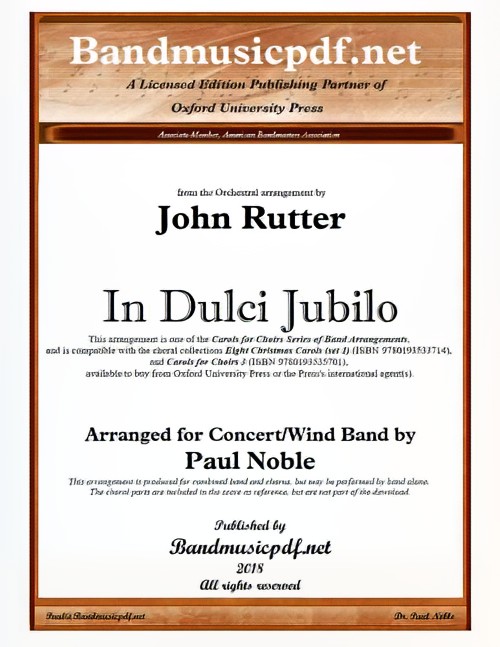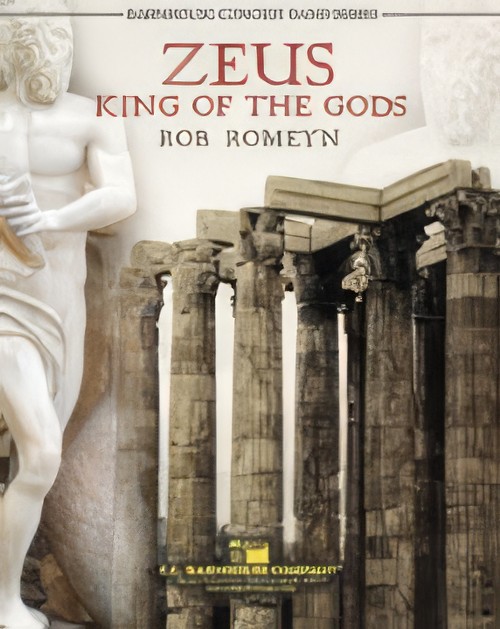Results
-
 £75.00
£75.00In Dulci Jubilo (Concert Band with Optional Choir - Score and Parts) - Noble & Rutter
One night in 1328, the German mystic and Dominican monk Henrich Suso (or Seuse) had a vision in which he joined angels dancing as the angels sang to him Nun singet und seid froh or In Dulci Jubilo. In Suso's biography (or perhaps autobiography), it was written: Now this same angel came up to the Servant [Suso] brightly, and said that God had sent him down to him, to bring him heavenly joys amid his sufferings; adding that he must cast off all his sorrows from his mind and bear them company, and that he must also dance with them in heavenly fashion. Then they drew the Servant by the hand into the dance, and the youth began a joyous song about the infant Jesus, which runs thus: 'In dulci jubilo', etc. In Dulci Jubilo is among the oldest and most famous of the macaronic songs, one which combines Latin and a vernacular language such as English or German. Five hundred years later, this carol became the inspiration for the 1853 English paraphrase by John Mason Neale, Good Christian Men, Rejoice. Perhaps the earliest English version appeared c.1540. That popularity has endured for nearly 700 years. It's the rare contemporary collection of Christmas carols that doesn't contain a carol based on this ancient jewel.
Estimated dispatch 7-14 working days
-
 £189.99
£189.99Flashback (Concert Band - Score and Parts) - De Haan, Jan
A flashback is an interesting psychological phenomenon: a seemingly random trigger can bring back long-forgotten memories from the subconscious mind. The composer underwent a similar experience before writing this piece. He was asked to write a piece for The National Youth Fanfare Band in the Netherlands, one which he heard perform many years ago. All of a sudden he remembered Deep Harmony, a piece frequently programmed back then. He used his own flashback-experience as an inspiration to weave an old English hymn into his new composition, much like a musical flashback. The right idea at the right moment, as this piece will prove!Duration: 11:00
Estimated dispatch 7-14 working days
-
 £84.99
£84.99Charming Salzburg Wind Band Set (Score & Parts)
Salzburg, birthplace of Wolfgang Amadeus Mozart, inspired Dutch composer Henk Hogestein to write this musical tribute. Mozart was born in this charming Austrian town in January 1756. He was a musical prodigy - at the age of four he began receiving lessons from his father Leopold and at the age of six he was composing smart minuets and other short pieces. The composition Charming Salzburg is based on a theme from Mozart's opera Die Zauberfl?te, which he completed in 1791. The greatest composer of his day - the greatest of all time according to some - the brilliant Mozart wrote some of the world's best operas with Die Zauberfl?te was his last. 0:03:00
Estimated dispatch 7-14 working days
-
 £72.99
£72.99Lyric for Band - George Walker
In 1946, George Walker was still doing graduate work at the Curtis institute when he composed Lyric for Strings, which would prove over the coming decades to become one of the most performed and enduring string orchestra works of the 20th Century. This first-ever edition for symphonic wind band was arranged by Dr. Luci Disano and premiered by The President's Own United States Marine Band on August 24, 2022. George Walker (June 27, 1922 - August 23, 2018) began his groundbreaking career as a young piano virtuoso and was admitted to Oberlin College on a scholarship following his first public recital at the age of 14. Graduating with the highest honors in his Conservatory class, he was admitted to the Curtis Institute of Music, becoming the first black graduate of this renowned music school. His works demonstrate a wide range of artistic excellence in genres ranging from instrumental and vocal solos and chamber music to compositions for orchestra and other large ensembles. He is the first black composer to be awarded the Pulitzer Prize.
Estimated dispatch 7-14 working days
-
 £435.40
£435.40Goldberg 2012 - Svein H. Giske
The first time I heard Bach's Goldberg Variations was in the movie Silence of the lambs, in the early 1990s. I noticed the beautiful background music in one of the scenes, but at that time I didn't know what it was. A few years later, when I was studiying at the Grieg Academy, I got to know the entire piece. For me, this is a piece of music which I can listen to countless times. I think it sounds as fresh today as it did more than 15 years ago and it never ceases to inspire me. Both Bach's composition and Glenn Gould's famous 1955 recording (which was the first one I heard) still makes a great impression on me. Before Gould recorded it at age 22, it wasn't a highly ranked piece amongst pianists and Bach was by many viewed as a bit old-fashioned. The young Canadian turned all this around. He managed to portray Bach in a reformed way, producing fine nuances in phrasing and making the many layers in Bach's music more transparent than anyone before him. Thus he plunged both himself and Bach (back) onto the international music scene. When The Norwegian Band Federation (NMF) asked me to write the test piece for NM in 2012, it was only natural for me to use the Goldberg Variations as a starting point and inspiration for my work. Since I was a teenager at NMF's summer courses in the mid eighties I've always listened to many different styles of music. Growing up in Sunnmre with the Brazz Brothers as teachers and mentors, jazz-, pop/rock- and folk music were early on a natural part of my musical background. I also have my classical education from the Grieg Academy on trumpet. As the title of my piece implies, I've wanted to bring Bach to the present and put his music into various modern musical landscapes. I think you can bring about a special kind of energy when music from different genres are mixed and I've tried to do this by mixing Bach with artists and musical styles from the present. In Goldberg 2012, the music is often constructed by several layers, which in a way are living parallel musical lives. They are seemingly moving or floating freely, almost unaware of each other, but bound together by the same basic pulse. The rythms, however, are often notated on a different rythmic subdivision level than the usual 8th- or 16th note levels. By doing this, I hope to achieve transparent sounds that rythmically are perceived as more free and detached from each other. In large sections of the piece, pop/jazz is fusioned with elements from Bach. I guess you could have this little scene as a synopsis for the piece: picture a group of musicians meeting: some are classical performers, some are jazz. They start to improvise together, each in their own voice or musical dialect and I'm sort of in the middle, trying to write down what they are playing. This is what I feel much of Goldberg 2012 is about. The foundation of the piece, in addition to Bach and references from pop/jazz music, lies also in my own material. This material, basically two chords, is heard in it's purest form in the 1st movement. I use these chords to create scales, new chords and different motifs which contribute to blend together the different moods of the piece. It has not been my intention to copy Bach's form (theme and 30 variations), but rather to use the bits and pieces that I like the most as an inspiration for my own variations. The 1st movement, Aria 2, is for my 3rd son, Olav, who was born on the 21st of April 2011, and the 5th movement, From long ago, is dedicated to the memory of my father, Svein J. Giske, who passed away on the 6th of June 2011. -Svein H. Giske, January 2012-
Estimated dispatch 7-14 working days
-
 £79.99
£79.99Commemoration - James Barnes
Commemoration was commissioned by the members of the Northwest North Carolina Bandmasters Association to recognize the distinguished career of Dr. William A. Gora, the longtime Director of Bands at Appalachian State University, who passed away in 2015. Bill was loved by his students, respected by his peers and cherised by his many friends. A brilliant musician, a fine conductor and a warm human being with a marvelous sense of humor, Bill has been sorely missed by all. Gora was friends with composer James Barnes for over 40 years. They met when Barnes was still in graduate school at Kansas and Gora had just finished his DMA at the University of Florida. When the NNCBDA asked Barnes to compose a work in Bill's honor, he was honored to do so. He decided to write a cheerful work for Bill, full of energy, color and melody, because he knew this is what he would have wanted; no funeral dirges for Bill Gora. The soft middle portion of the work, a hymn-like tune scored in saxophone choir, was included because Bill was a fine saxophonist and, for many years, the saxophone teacher at ASU.
Estimated dispatch 7-14 working days
-
 £183.20
£183.20Fest - Polonaise - Johan Svendsen
Johan Svendsen (1840 - 1911) was the first great Norwegian symphonic composer, as well as one of the leading conductors of his time. Next to Edv. Grieg, he was the most prominent figure in Norwegian music life at the end of the 1800's. Although he came from humble beginnings in Chistiania (now Oslo), he was to become a cosmopolitan who felt at home all over Europa. Svendsen spent most of his adult life abroad, living in Copenhagen for 25 years as maestro for the Royal Theatre Orchestra. Nonetheless he retained contact with Norway troughout these years and was a frequent and popular guest in his native country. He wrote his Festival Polonaise for a ball in 1873. This polonaise ina big ABA style
Estimated dispatch 7-14 working days
-
£84.99
Charming Salzburg - Wolfgang Amadeus Mozart
Salzburg, birthplace of Wolfgang Amadeus Mozart, inspired Dutch composer Henk Hogestein to write this musical tribute. Mozart was born in this charming Austrian town in January 1756. He was a musical prodigy - at the age of four he began receiving lessons from his father Leopold and at the age of six he was composing smart minuets and other short pieces. The composition Charming Salzburg is based on a theme from Mozart's opera Die Zauberflte, which he completed in 1791. The greatest composer of his day - the greatest of all time according to some - the brilliant Mozart wrote some of the world's best operas with Die Zauberflte was his last.
Estimated dispatch 7-14 working days
-
 £189.99
£189.99Flashback - Jan de Haan
A flashback is an interesting psychological phenomenon: a seemingly random trigger can bring back long-forgotten memories from the subconscious mind. The composer underwent a similar experience before writing this piece. He was asked to write a piece for The National Youth Fanfare Band in the Netherlands, one which he heard perform many years ago. All of a sudden he remembered Deep Harmony, a piece frequently programmed back then. He used his own flashback-experience as an inspiration to weave an old English hymn into his new composition, much like a musical flashback. The right idea at the right moment, as this piece will prove!
Estimated dispatch 7-14 working days
-
 £98.00
£98.00Zeus: King of the Gods - Romeyn, Rob
This monumental programmatic work from the pen of Rob Romeyn captures the myth and legend of Zeus, the mythical master of the gods and men. A sky god, he controls lightning, which he uses as a weapon, and thunder. It opens as Zeus becomes involved in the Trojan war, hurling lightning bolts at his opponents. The tension soon subsides as we are introduced to the eternally beautiful Hera, whom Zeus would eventually marry. The music then ensues as our story unfolds, as Zeus made his domain the mountaintops and clouds where he could survey all creation, and inflict pain and justice on all evildoers. Tension builds as Zeus battles Typhon in hand to hand combat, ending ultimately with Zeus throwing the enormous Mt. Etna at the monster, pinning him underneath. From here, the tension subsides, and a beautiful lyrical section builds to an ending of incredible power and grandeur as Zeus again reaffirms his stature as the ruler of Mt. Olympus. This exceptional work is a wonderful addition to any concert or festival performance!Duration: 8.15
Estimated dispatch 7-14 working days
